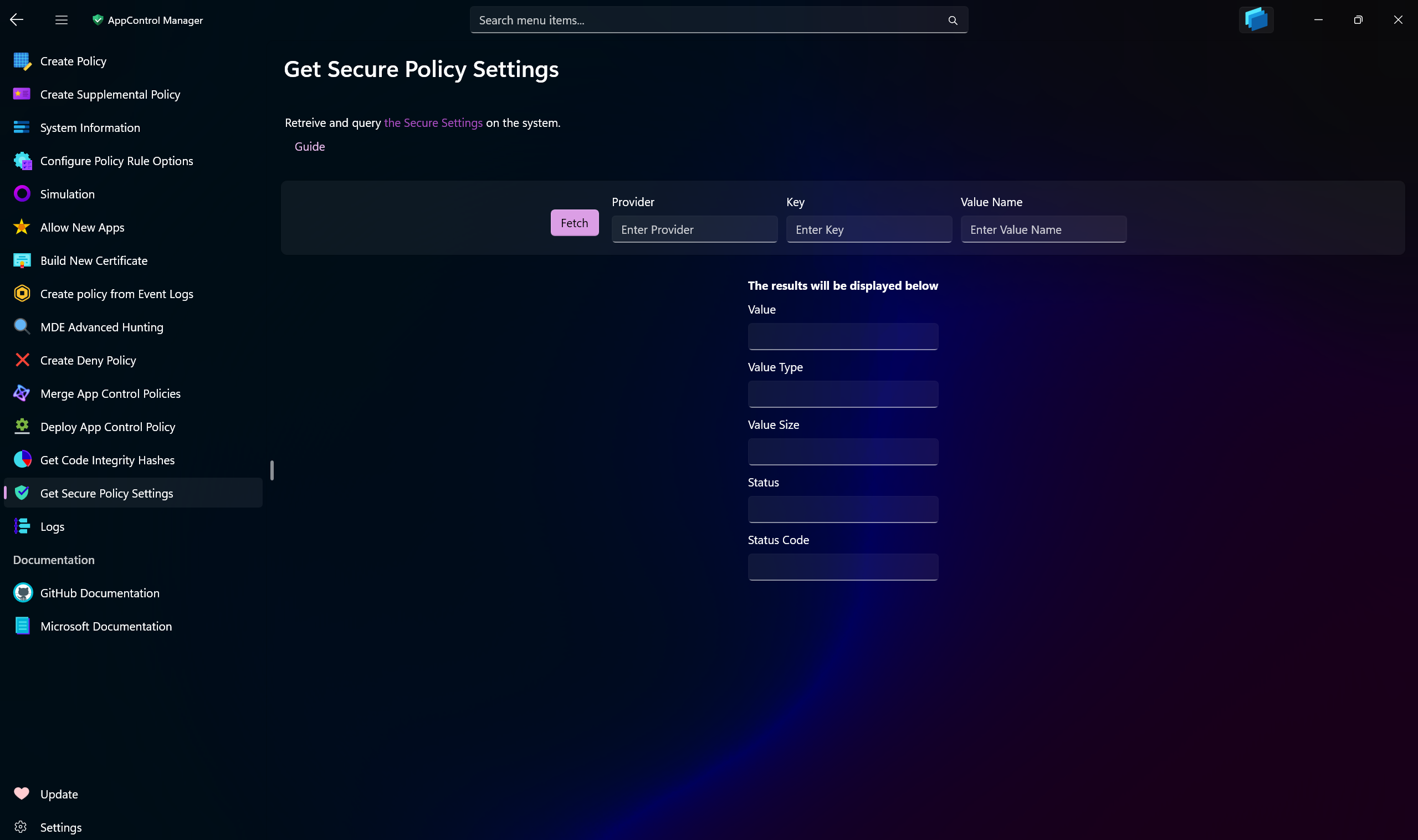-
Notifications
You must be signed in to change notification settings - Fork 168
Get Secure Policy Settings
Violet Hansen edited this page Dec 27, 2024
·
2 revisions

In this AppControl Manager page, you can verify whether a policy with certain secure settings is deployed on the system or not.
App Control for Business policies expose a Settings section where policy authors can define arbitrary secure settings. Secure Settings provide local admin tamper-free settings for secure boot enabled systems, with policy signing enabled. Learn more about them in here.
- Value: The actual value of the string.
-
ValueType: The type of setting:
WldpString,WldpIntegerorWldpBoolean. - ValueSize: the size of the returned value.
- Status: True/False depending on whether the setting exists on the system.
- StatusCode: 0 if the value exists on the system, non-zero if it doesn't.
You can use the set-cipolicysetting PowerShell cmdlet to set a secure setting in an XML policy file.
Set-CIPolicySetting -FilePath 'Policy.xml' -Provider 'WDACConfig' -ValueType 'Boolean' -Value '1' -ValueName 'IsUserModePolicy' -Key '{4a981f19-1f7f-4167-b4a6-915765e34fd6}'Set-CIPolicySetting -FilePath 'Policy.xml' -Provider 'SomeProvider' -ValueType 'String' -Value 'HotCakeX' -ValueName 'Author' -Key '{495e96a3-f6e0-4e7e-bf48-e8b6085b824a}'Set-CIPolicySetting -FilePath 'Policy.xml' -Provider 'Provider2' -ValueType 'DWord' -Value '66' -ValueName 'Role' -Key '{741b1fcf-e1ce-49e4-a274-5c367b46b00c}'-
DWordvalue is the same as integer orWldpInteger. -
In order to set a Boolean value using the
Set-CIPolicySettingcmdlet, you need to use 1 for True or 0 for False, that will create a valid policy XML file that is compliant with the CI Policy Schema.
- Create AppControl Policy
- Create Supplemental Policy
- System Information
- Configure Policy Rule Options
- Simulation
- Allow New Apps
- Build New Certificate
- Create Policy From Event Logs
- Create Policy From MDE Advanced Hunting
- Create Deny Policy
- Merge App Control Policies
- Deploy App Control Policy
- Get Code Integrity Hashes
- Get Secure Policy Settings
- Update
- Sidebar
- Validate Policies
- View File Certificates
- Introduction
- How To Generate Audit Logs via App Control Policies
- How To Create an App Control Supplemental Policy
- The Strength of Signed App Control Policies
- How To Upload App Control Policies To Intune Using AppControl Manager
- How To Create and Maintain Strict Kernel‐Mode App Control Policy
- App Control Notes
- How to use Windows Server to Create App Control Code Signing Certificate
- Fast and Automatic Microsoft Recommended Driver Block Rules updates
- App Control policy for BYOVD Kernel mode only protection
- EKUs in App Control for Business Policies
- App Control Rule Levels Comparison and Guide
- Script Enforcement and PowerShell Constrained Language Mode in App Control Policies
- How to Use Microsoft Defender for Endpoint Advanced Hunting With App Control
- App Control Frequently Asked Questions (FAQs)
- Create Bootable USB flash drive with no 3rd party tools
- Event Viewer
- Group Policy
- How to compact your OS and free up extra space
- Hyper V
- Overrides for Microsoft Security Baseline
- Git GitHub Desktop and Mandatory ASLR
- Signed and Verified commits with GitHub desktop
- About TLS, DNS, Encryption and OPSEC concepts
- Things to do when clean installing Windows
- Comparison of security benchmarks
- BitLocker, TPM and Pluton | What Are They and How Do They Work
- How to Detect Changes in User and Local Machine Certificate Stores in Real Time Using PowerShell
- Cloning Personal and Enterprise Repositories Using GitHub Desktop
- Only a Small Portion of The Windows OS Security Apparatus
- Rethinking Trust: Advanced Security Measures for High‐Stakes Systems
- Clean Source principle, Azure and Privileged Access Workstations
- How to Securely Connect to Azure VMs and Use RDP
- Basic PowerShell tricks and notes
- Basic PowerShell tricks and notes Part 2
- Basic PowerShell tricks and notes Part 3
- Basic PowerShell tricks and notes Part 4
- Basic PowerShell tricks and notes Part 5
- How To Access All Stream Outputs From Thread Jobs In PowerShell In Real Time
- PowerShell Best Practices To Follow When Coding
- How To Asynchronously Access All Stream Outputs From Background Jobs In PowerShell
- Powershell Dynamic Parameters and How to Add Them to the Get‐Help Syntax
- RunSpaces In PowerShell
- How To Use Reflection And Prevent Using Internal & Private C# Methods in PowerShell
